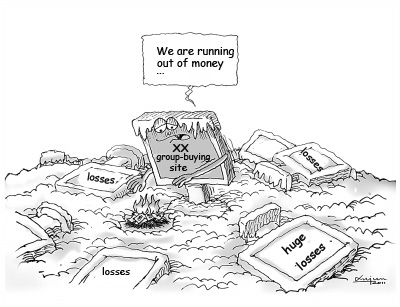Blind expansion and competition
The People's Daily pointed out that the losses of the group purchase sector have mainly been caused by earlier blind expansion and competition.
Nuomi.com, a group buying website established by Renren Network, a Chinese social networking site very similar to Facebook, reported a $6.54 million loss in the third quarter of this year, with revenue totaling $1.7 million and expenses amounting to $8.24 million.
Prospectus of lashou.com also showed that the company's net loss reached 390 million yuan ($61 million) in the first half of 2011, 90 times that of the same period last year.
Zhao Zhanling, an attorney who has dealt with many cases concerning disputes between group buying websites and their employees, added that the sites have been expanding irrationally in a bid to find favor with investors, giving no thought to market saturation at all.
"The Ordos branch of 55tuan.com in Inner Mongolia, in spite of paying its staff their full monthly salaries, hasn't closed any deals since it was set up three months ago," Zhao said.
"The group buying industry is suffering from a big bubble, and it's just a matter of time before the bubble bursts," commented Fang Xingdong, founder of bokee.com, the first Chinese blog, and president of Chinalabs, a research organization of China's high-tech companies.
Feng Po, an analyst at China Venture, noted that except strategic investors, venture capital institutions have already stopped investing in group buying websites. "Those sites must reduce their spending to survive," he said.
In China, the revenue of group purchase websites also partially comes from commissions from business operators for introducing consumers, said the People's Daily, adding that the irrational competition among domestic major group purchase websites has, however, reduced the percentage of sales commissions from the original 20 percent to the current 10 percent, nearly halving the profit margin of major group purchase websites.
Ways out
Data from etao.com show that from June to October, sales of physical products on group buying websites accounted for 52.75 percent of the total volume, while transactions for services and entertainment saw a sharp decrease.
At this, Wang Tingting, an analyst at iResearch, a leading consulting group, warned that this is not a good sign, since in terms of e-commerce for physical articles, the group buying sites are quite unlikely to gain any slice of the market pie when competing with Dangdang.com and 360buy.com, the leading B2C platforms.
The group buying sites should focus on the service industry, and develop a different business model, Wang suggested.
The People's Daily predicted that the following three trends will probably be seen in the future: First, larger consolidations will emerge in the group purchase market and the number of players in the market will sharply fall, gradually dropping to a normal level that the market can sustain.
Second, the players in the purchase group market are excessively similar to others, lacking differentiated operations. More group purchase websites will likely build up their unique brands in the future. Third, the current low gross profit margin of the group purchase sector is unsustainable and the loss-bearing and low-price expansion means must be changed.


















